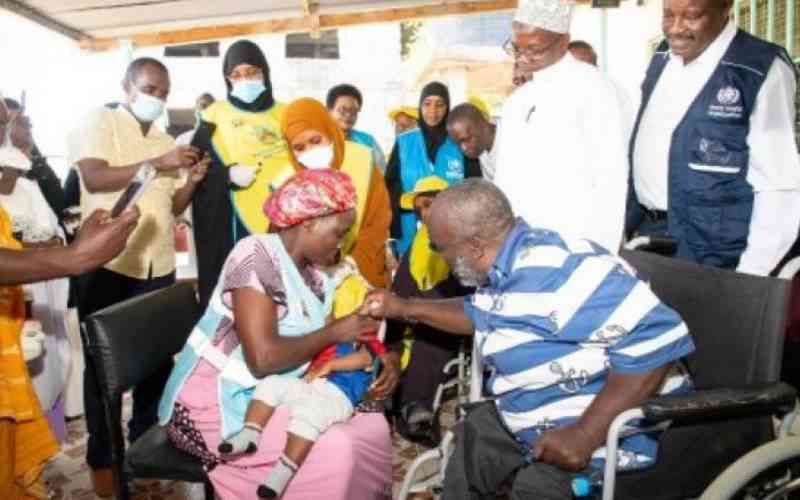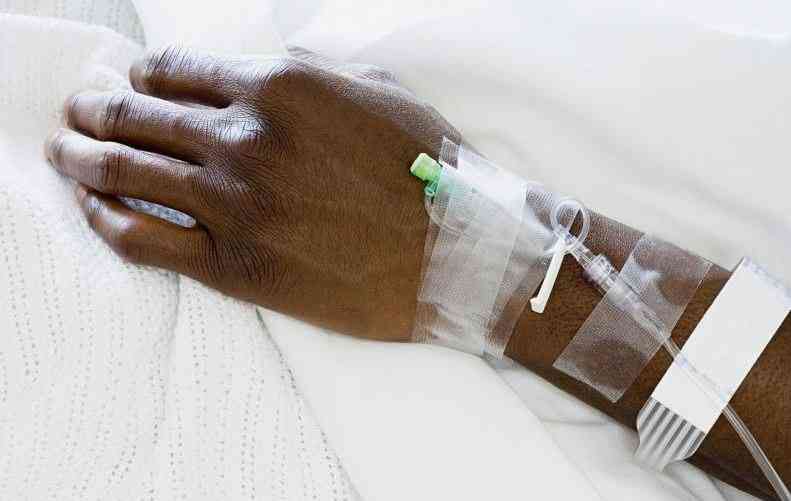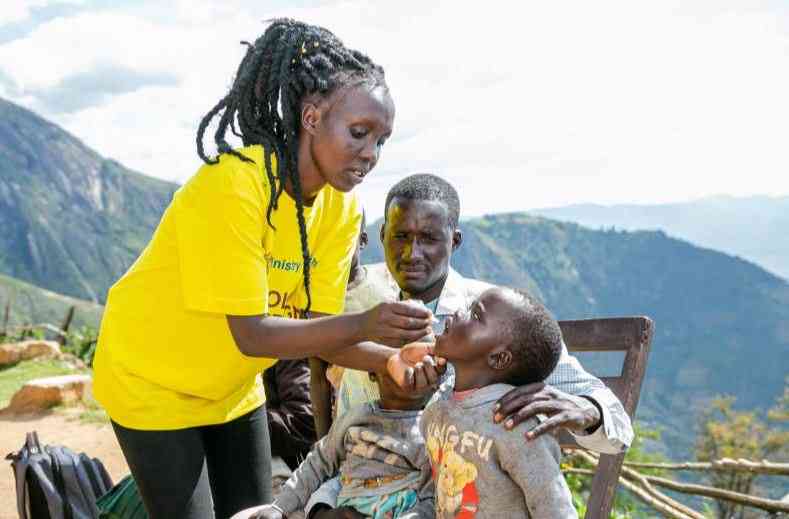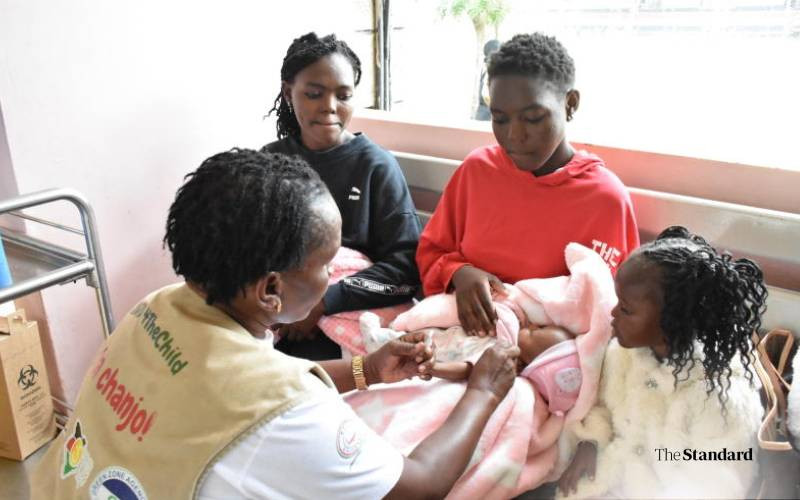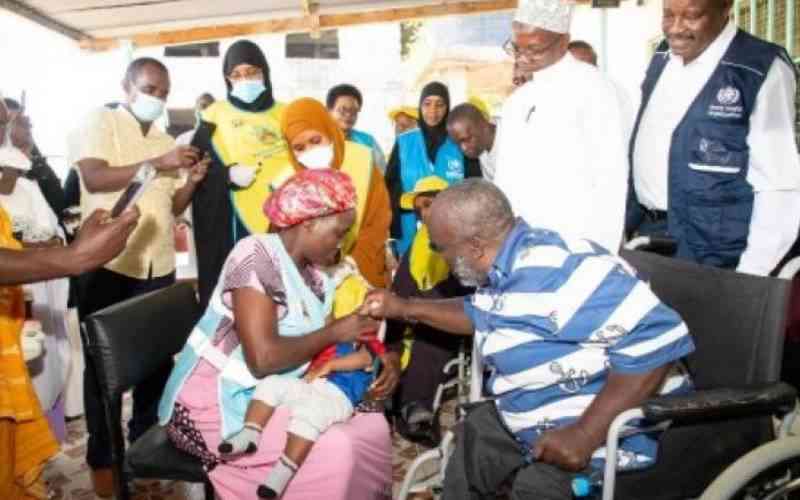
Health experts and survivors of polio are calling on the government to urgently address a critical shortage of newborn vaccines, warning that continued delays are putting infants at risk of paralysis and early death.
Leading health organisations and child health advocates have written to the Principal Secretary for Medical Services, Dr Ouma Oluga, as well as to Parliament, demanding immediate intervention to resolve the ongoing stock-outs and ensure newborns are protected.
Polio survivor and vaccine advocate Harold Kipchumba has also issued a personal appeal to Dr Rose Jalang’o, head of the national vaccination programme, urging her to take direct responsibility in ensuring that every newborn receives life-saving immunisations.
“The government must be called to order. This is not only exposing children to early deaths. But in fact, a plan to fiddle children,” regretted Kipchumba, overwhelmed by emotions during an interview with The Standard.
Unable to hold back his tears, Kipchumba, who was paralysed after missing the polio vaccine during childhood, said failure to act is exposing newborns to “early deaths, maiming and lifetime paralysis.”
“As a victim of polio, and a face of what polio can do to someone's life. I will not sit down as a polio advocate as children's children are exposed. This nonsense of dishing millions in the name of empowerment and cannot put money in vaccines; it is so painful,” he said.
These concerns follow a recent statement by PS Oluga to the effect that the country has limited stocks of polio and BCG (tuberculosis), just enough to last only two weeks, while rotavirus vaccines are estimated to last a month.
However, while expressing concern, Kipchumba maintained newborns across the country are still not receiving vaccines, questioning who exactly they are being reserved for.
- Health Ministry shake-ups raise hard questions on UHC rollout
- All UHC staff directed to resume duty immediately
- Diabetes, hypertension silent killers in rural areas - medics
- Health Ministry under fire after inviting BAT to lead tobacco campaign
Keep Reading
He recalled that a month ago, Health CS Adan Duale acknowledged the stock-outs and promised they would be replenished within two weeks.
“We're being fed on lies. A month ago, they claimed they were going to distribute vaccines. We still have no stock. They are now giving other promises. Where are the said available vaccines? They truly don't exist. Unless they tell us the specific hospitals and regions where we shall carry all babies to get vaccinated.
“Are they targeting a specific class of people because ordinary mothers are not accessing them? You do not lie about the lives of babies,” charged Kipchumba.
He urged Kenyans, and especially vaccine champions and child health advocates, to push the government to ensure that every baby is vaccinated.
Kipchumba’s sentiments reflect the frustration of thousands of mothers whose newborns have missed out on crucial vaccines, particularly polio and BCG, which have been out of stock for almost a month.
Kenya is once again facing a critical shortage of key childhood vaccines, leaving thousands of infants unprotected from life-threatening yet preventable diseases.
Health experts and civil society organizations now warn that the stock-outs could undermine the country’s hard-won progress on immunisation and disease prevention.
Last week, the Health NGOs Network (HENNET), alongside member organizations including Stop TB Partnership Kenya, WACI Health, INERELA Kenya, and the National TB Champions, issued a public statement expressing deep concern over the ongoing shortage of BCG and polio vaccines.
The shortages come despite Kenya’s commitments under global and national frameworks—including the Immunization Agenda 2030, the Global Vaccine Action Plan, and its own National Immunization Strategy—to reduce the number of zero-dose children and improve vaccine coverage.
Health advocates caution that the prolonged stock-outs threaten to reverse critical gains, erode public confidence in the health system, and significantly raise child mortality rates.
Civil Society Organisations (CSOs) warn that communities are now increasingly vulnerable to outbreaks of vaccine-preventable diseases like polio and measles—diseases that Kenya has spent decades trying to control and eliminate.
In a letter dated June 5, 2025, addressed to the National Assembly Departmental Committee on Health, HENNET outlined a series of urgent recommendations.
Key among them are confirmation of current vaccine stock levels, immediate procurement and equitable distribution of vaccines, intensified community engagement and risk communication, strengthening of the health system, increased domestic financing for immunisation, and the development of a sustainable health financing plan.
According to a statement released by the Ministry of Health on Friday, 12 counties are currently facing vaccine stock-outs. The remaining counties have limited supplies expected to last just two more weeks.
The Ministry attributed the shortages to global supply chain disruptions, citing increased international demand and delays in shipments.
Despite the explanation, health stakeholders are calling for stronger systems to ensure consistent vaccine availability.
"The confirmed vaccine stockouts are a sad situation and have for sure directly increased the number of children in Kenya who have not received any vaccination. As the Health NGOs Network, we call all duty bearers to put our children first and ensure that we never find ourselves in the same situation we are in, and we also found ourselves in last year,” said Dr Margaret Lubaale, Executive Director of HENNET.
This crisis is unfolding just weeks before the critical Gavi co-financing deadline on June 30, 2025.
Kenya is required to contribute Sh1.6 billion towards its share of vaccine procurement costs.
Although Sh930 million was released in May 2025, the government remains non-committal on a timeline for settling the full Gavi, the Vaccine Alliance Co-financing obligation of KSh1.6 billion for the 2025 financial year.
In a letter to the Kenyan Government in January, Gavi warned that failure to make the payment by June 30, 2025, would lead to a suspension of vaccine supplies to Kenya, raising fears that the current shortage could persist and further disrupt the delivery of life-saving immunisations.This is not the first time Kenya has experienced vaccine shortages.
Experts point to the need for improved planning, timely procurement, stable domestic financing, and transparent reporting of vaccine stock levels.
With the 2025/26 national budget process underway, focus is turning to Parliament and the Ministry of Health to ensure full funding for immunisation programmes—including co-financing contributions and systems to prevent future disruptions.
 The Standard Group Plc is a multi-media organization with investments in media platforms spanning newspaper print
operations, television, radio broadcasting, digital and online services. The Standard Group is recognized as a
leading multi-media house in Kenya with a key influence in matters of national and international interest.
The Standard Group Plc is a multi-media organization with investments in media platforms spanning newspaper print
operations, television, radio broadcasting, digital and online services. The Standard Group is recognized as a
leading multi-media house in Kenya with a key influence in matters of national and international interest.

